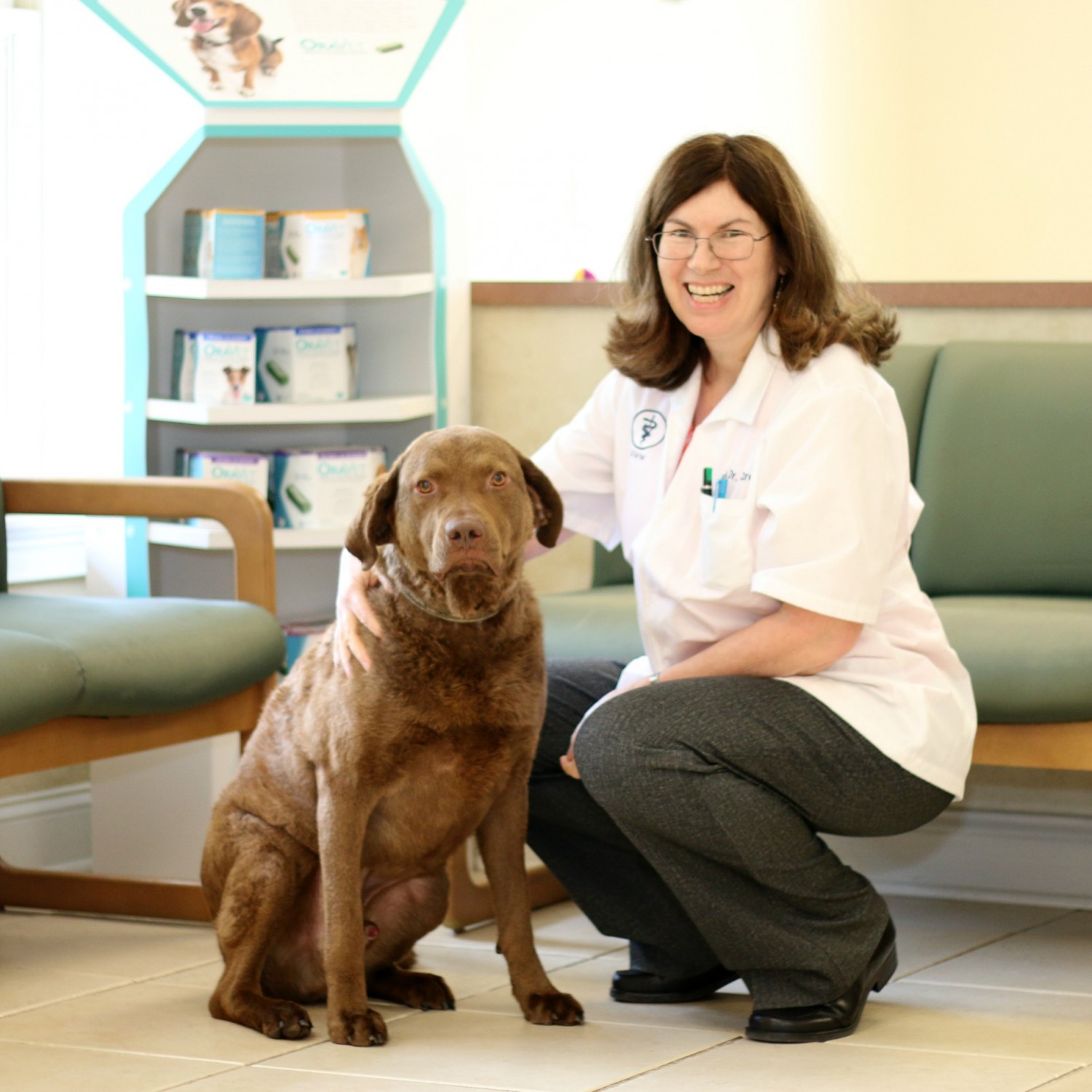|
Canine Wellness and Preventative Care
|
Disease prevention and early detection is essential in allowing your pet to live a long and happy life. We offer comprehensive individualized wellness care for every stage of your dogs life.
Our Canine Wellness program includes:
- Physical Examination
- Oral Health Evaluation/Dental Care
- Tick Borne Disease Discussion
- Heartworm Prevention and Testing
- Intestinal Parasite Control and Analysis
- Immunizations
- Early Disease Detection
- Permanent Identification
- Pharmaceuticals/Supplements
- Flea Prevention and Control
- Nutrition Counseling
- Behavioral Counseling
- Pain Management
|

|
Physical Examination
We stress the importance of an annual exam and biannual exam in senior and high-risk patients. Thorough check-ups and preventive care can help alleviate serious health problems. At the physical examination visit the doctor will perform a complete physical with an oral exam, review your pet's medical history, recommend needed tests or services, and discuss care recommendations.
Dental and Oral Health Care
Regular dental hygiene care is important in maintaining your pet's teeth and protecting your pet's health. Healthy teeth and gums are essential in providing your dog or cat with a long and happy life. Dental disease is the most common disease affecting pets. By the age of three, the majority of dogs are already suffering from gingivitis and periodontal disease.
Dental plaque and halitosis is a source of infection in animals, it is painful and will progress to tooth loss. It is not possible to do a complete dental cleaning on animals unless they are under anesthesia. Animals need to be under anesthesia so we can ultrasonically scale the inside and outside of the teeth as well as under the gum line.
If there is visible tartar on the teeth then you should schedule an appointment for your pet. After a thorough examination of your pets mouth, a professional cleaning and/ or oral surgery to remove diseased teeth may be recommended. Brushing the teeth when tartar is present does not help the pet and is in fact is often painful.
Pets develop dental disease from not brushing the teeth and not having the teeth professionally cleaned. We brush our teeth every day and see the dentist regularly to prevent dental disease and the same steps are needed in pets affected with periodontal disease. Dental Care is important to your dog or cat's health.
Learn more about Dental Disease in dogs by clicking here.
Tick Borne Disease
We have seen a dramatic increase in tick related disease in the past several years. Dogs are susceptible to acquiring several infections from ticks; including Lyme disease( borrelia), ehrlichia, anaplasma, babesia, and bartonella. We are recognizing co-infections of lyme disease and ehrlichia or anaplasma causing significant disease in pets. All of these diseases can manifest in life threatening ways in the dog.
Owners must protect their dogs from tick exposure in order to decrease the incidence of these infections. Our healthcare team will be able to determine the most effective methods and products for tick control in your dog, taking into consideration your pet's age, breed, lifestyle, and exposure risk.
Heartworm Prevention and Testing
Every dog should be on monthly heartworm prevention to protect against heartworms and intestinal parasites.
Heartworms are transmitted to dogs by mosquitoes. Our doctors have seen an increase in heartworm disease in this area over the past couple of years, we believe that the transport of dogs for adoption from the south has increased the prevalence of mosquitos infected with heartworm. Dogs need to be tested for heartworms before beginning preventative (unless less than 6 months of age). These tests are necessary because it is dangerous for your dog to receive the preventative if he/she is heartworm positive. Once your dog is on monthly preventative we commonly check for exposure every two years.
Intestinal Parasite Control
Intestinal parasites including hookworms, roundworms, whipworms, tapeworms, giardia, and coccidia can make your pet very ill and some of these parasites can infect people! We provide appropriate testing to screen your pet for these parasites and prescribe medication to treat and prevent reinfection. Puppies are at high risk for infection, so we treat all puppies appropriately to eliminate infection. We stress the significance of zoonotic infection (people can get serious disease from some of these parasites) and educate owners in prevention methods.
The Center For Disease Control and Prevention strongly recommends that all dogs be on year- round heartworm preventative to control intestinal parasites, which dogs routinely pick up from their environment, soil contact, fleas, and consumption of prey animals.
Intestinal Parasite Analysis
As many different parasites infect dogs and no one dewormer controls every parasite, it is necessary to check your pet's stool for parasites annually. All fecal samples at our veterinary hospital are submitted at an outside reference laboratory , where the samples are centrifuged before analysis, which has been shown to significantly increase the accuracy of the test.
As parasites are evident on a fecal analysis only in certain stages of their life-cycle, a 'negative' fecal does NOT mean that your pet is clear of parasites. A 'positive' fecal allows the veterinarian to choose a dewormer that is effective against the parasites we know your pet has. We recommend a fecal analysis at least once a year.
Immunizations and Vaccine Titers
Immunizations are a vital tool in preventing serious and potentially fatal disease. Recent research has shown that some immunizations last for three years or more, while others require annual revaccination.
Several leading veterinary immunologists believe that repeated vaccination of a pet that is adequately protected against a disease can aggravate immune mediated and allergic disease.
Our goal is to adequately protect your pet from fatal diseases without potentially aggravating other disease conditions. At LVH our doctors routinely screen antibody titers to measure if an animal has adequate protection against a disease. The doctors and technicians will discuss core and non core vaccines and work with you to determine which vaccines are necessary for your pets well being. We do not revaccinate animals that have adequate titers. After a puppy has completed the initial vaccine series and annual boosters, we routinely titer these patients for distemper and parvovirus. We use the highest quality vaccines available and use three year duration vaccines when possible.
Early Disease Detection
As pets age it is important to acquire a baseline assessment of their kidney, liver, and thyroid metabolic function. Early detection of disease allows us to treat or slow its progression. We strongly recommend screening bloodwork, urinalysis and/ or radiographs in senior patients on an annual basis.
Permanent Identification
We strongly recommend microchip identification of all pets. Microchipping is a simple permanent means of identifying your pet. If your pet is lost or stolen and brought to a shelter, pound or veterinary hospital, he can be positively identified and safely returned to you. We implant microchips with a syringe and needle in the subcutaneous tissue over the shoulder blades. Many clients prefer to have this done during an anesthetic procedure to lessen the pain of the large bore needle used with the microchip, but this injection can be done easily in an awake patient.
Pharmaceuticals/Supplements
We maintain an inventory of pharmaceuticals, vitamins, shampoos, flea and tick control products and heartworm preventatives to meet the needs of your pet. We also carry a full line of prescription diets. We will help you choose the product most beneficial for your pet, based on their unique lifestyle.
For your convenience we now provide an online pharmacy with more heartworm, flea and tick preventative choices available, additional prescription diets, and many prescription medications available at competitive prices. This site provides you these products directly from our distributor and are guaranteed by the manufacturer. Follow this link to Vets First Choice for convenient online ordering of products and medications.
Individualized Flea Control Programs
Fleas not only irritate your pet, they also carry disease and can cause serious allergic skin disease and infection.
We develop programs for the specific needs of your pet and your own particular environmental situation. Our healthcare team will review with you the best ways to control fleas in your house, in your yard and on your pet. We will assist you in selecting the flea control and prevention products most suitable to your pet and lifestyle.
Dietary Counseling
We will provide guidance regarding your pet's nutritional needs for each life stage, including dietary requirements for growth, weight maintenance and performance. Recent studies in animals has shown that obesity shortens pets lifespans and contributes to diseases, such as cancer, arthritis, and diabetes. We can help guide you to diet choices for your pet that will help them maintain their ideal body weight. Our technicians are able to determine your pet's body condition score and percentage of body fat.
Behavioral Counseling
We can provide advice regarding the correction of problems such as excessive barking, chewing, spraying, scratching, digging, house soiling and aggression. We refer to a board certified veterinary behaviorist to assist in management of many aggression cases. We also work with local trainers to assist in behavioral training.
Pain Management
|
At some point in their lives, pets may experience pain. Whether pain is associated with an acute injury, surgery or chronic disease such as arthritis, it can greatly affect the well-being and quality of life of our pets. Dogs and cats often hide symptoms of pain, making it difficult to recognize for most owners. At Litchfield Veterinary Hospital, your pet's comfort is our first priority. Annual or bi-annual wellness exams allow our veterinarians and healthcare team to assess your pet's well being. We'll help you learn to recognize subtle changes that may indicate pain. There are many options for treating pain in your pet from naturopathic supplements to pharmaceutical intervention, as well as physical therapy. Over the counter human medications can be toxic to your pet, therefore pain management should be under the direction of your veterinarian. Our team utilizes the Colorado Pain Scale.
Learn More:
Canine Pain Scale: http://www.vasg.org/pdfs/CSU_Acute_Pain_Scale_Canine.pdf
|

|
